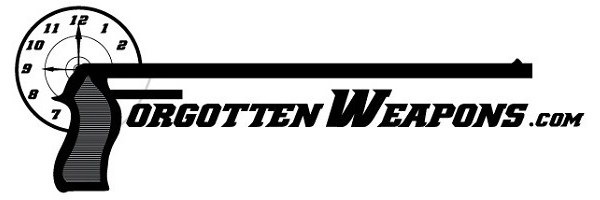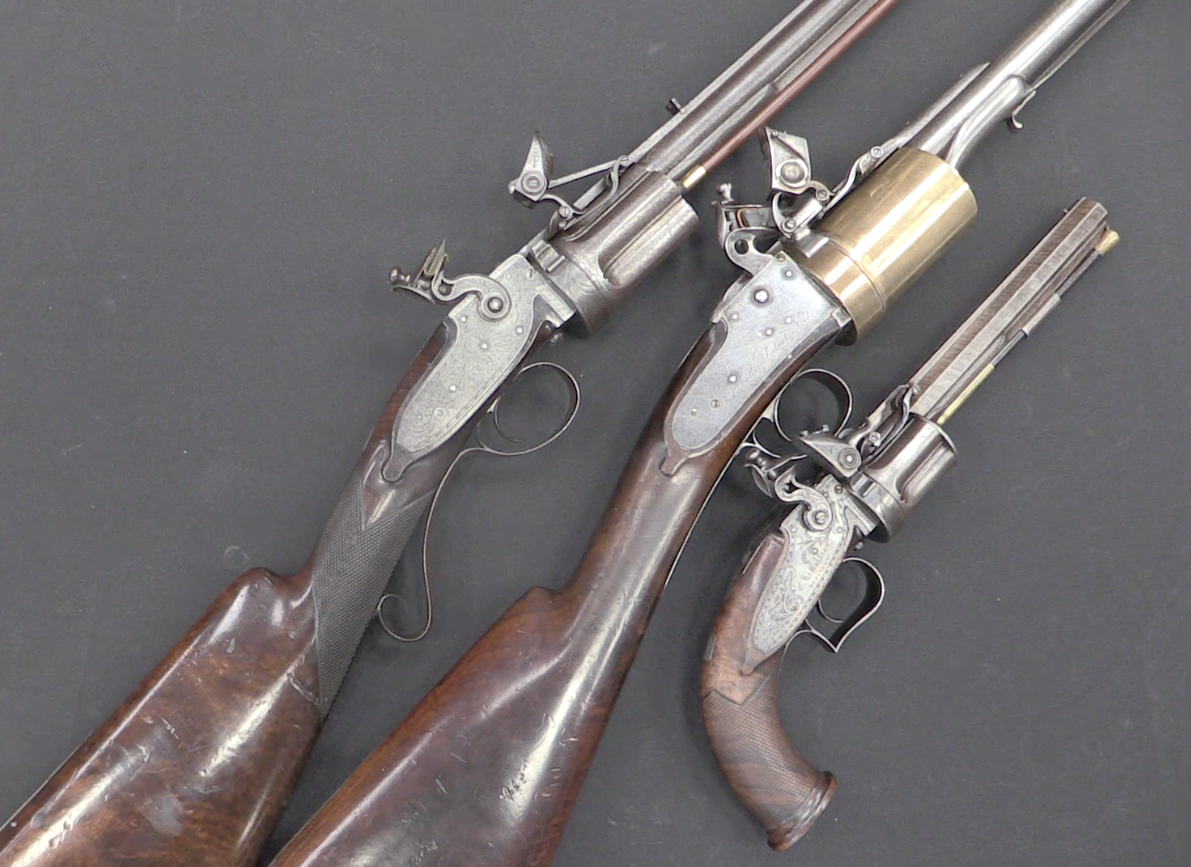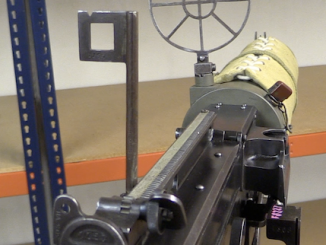The Farquhar-Hill was a semiauto rifle developed in Britain prior to World War 1. It was the idea of Birmingham gunsmith Arthur Hill, and financed by Aberdeen industrialist Mowbray Farquhar. The design began as a long-recoil system, but that was replaced with a unique spring-buffered gas operated mechanism before and production began.
Basically, a gas port in the barrel taps gas off to a piston, which moved about 3 inches rearward and was then caught and held by a latch. At that point, the other end of the spring would be released to move backward, pushing on the bolt and bolt carrier, unlocking and cycling the action. This gave the rifle a very light felt recoil impulse, and also buffered the bolt from potential over-pressure cartridges.
The Farquhar-Hill was chambered for the .303 British cartridge, and in its military form fed from 19-round drum magazines. A large order for 100,000 rifles was placed by the British military, but cancelled when WW1 ended. A small number of the rifles were sold in the military pattern as well as in box magazines fed sporting patterns, but Farquhar was more interested in pursuing military contracts, and would continue to work with machine gun designs going into the 1920s.
Thanks to the Institute of Military Technology for giving me access to these two rifles!




“I may have discovered…” LOL
Awesome rifle. Thank you Ian.
The rear sight is remarkably similar to the No4 MkI sight. Had an opportunity to handle a FH years ago with this sight. Wonder if the No4 R&D team took a good look at this sight.
What a nifty rifle.
Correct me if a am wrong here Ian but wouldn’t that mechanism make a good candidate for a “constant recoil” design? It should make it less sensitive to ammo and big temprature changes as well as enlonging the initial rearward impulse making bursts more accurate…
Overegineered sure, but sweet.
Farquhar is not pronounced “farkwar”, but “farcher” with the soft Scots ch as in “loch”
Oh fiddlesticks. I should have known. It seems like old English strikes again. If I’m not mistaken, several people with Germanic family names had to change the spelling of said names because other people kept mispronouncing them. One good example is the name Lockheed (as in Lockheed Martin), which had once been spelled as Loughead. I suppose some morons insulted Allan Lockheed by calling him “Loaf head” or “Log head.”
Rest assured that Boeing is the exact equivalent of the original Böing, a name you will still encounter frequently in Westphalia.
I know several people that have a last name of Aho, some of these pronounce the a as “ah” and others “A”.
And both are correctly pronounced.
The same type of different pronunciation goes on with my mothers maiden name.
So probably the pronunciation of Farquhar can be up to the person whose name it is.
In 1914 my grandfather a german citizen living in Manitoba was naturilzed canadian and changed his name from smelz to smelts
A bit unfortunate for my mom as smelts are a small smelly freshwater fish
However my grandfathers brother in new jersey did not bother to change the family name when he became american as apparently there was less prejudice against germans in the states
Don’t know if it led to many name changes but there was some pretty heavy prejudice against use of the German language in the US after the sinking of the Lusitania. For example, the “frankfurter” became a hot dog around that time. My maternal grandfather (b. 1909, I think) was from a family of Iowa Germans that had been speaking German at home/ in church/ with neighbors since at least the 1840s (immigration records are pretty scanty – heavens, they might have been illegal!) and I remember him saying that they went English-only even among family during WW1. By the time I knew him in the ’60s he had lost not only the language but any trace of an accent.
Early uses of hot dog in reference to sausage appeared in the New Brunswick (New Jersey) Daily Times (May 20, 1893), the New York World (May 26, 1893), and the Knoxville (Tennessee) Journal (September 28, 1893). Not everything German was changed due to WWI.
“1840s (immigration records are pretty scanty – heavens, they might have been illegal!)”
There was not something like “illegal immigration” at that time, because there was not law which can be broken by that act, see:
https://en.wikipedia.org/wiki/List_of_United_States_immigration_laws
first one which make possibility of illegal immigration was Page Act of 1875
What a nifty gas system. And dang if that bolt didn’t look an awful lot like a Mauser bolt. I presume the Farquhar-Hill is hammer fired and not striker fired?
Any chance of shooting one of the machine guns that uses the same system? I’ve been interested in those since I read the Ian Hogg machine gun book.
Neat rifle all right, but what gets me is why the hell they stuck with that rimmed cartridge so blasted long!
As to “Old English”, I had to re-afirm my surname 10/12 years ago.
It was Rice for the 4 generations prior to myself, but we just couldnt get any farther back than that 1809 birth of my gg grandfather!
Well, partially thanks to one of my great aunts, back when I was a kid, telling me “that it wasnt always Rice”, (which I paid absolutely no attention to at that time), Now, back on the farm where I grew up, when the little Jersey bull calves got stubborn, (which was always!), he called them “Ephraim”. Then when I got serious about “digging deaper”, I found out that she was right! And that old Ephraim III, yet, must have been very stubborn!
(And I would say that it still runs in the family!)
Now, it had always been pronounced “Rice”, but prior to my ggg grandfather it had been spelled “Royce”, after that pesky “Old English”!
Now, where the hell is my Rolls?????
Anyway, I took it on back from that 1805, clear to 1605!
With first setting foot on these shores, mid 1630s.
My seventh great grand father who came here as a todler, built a house in Wallingford CT that still stands today.
Though at the time box magazines not such a natural / dominant choice. Wouldn’t a ‘simple’ say 20 round box magazine have been a better option, even then, to this interesting but complex (and costly, not only in cash, but also training and in several ways operationally) rotary ‘thing’.